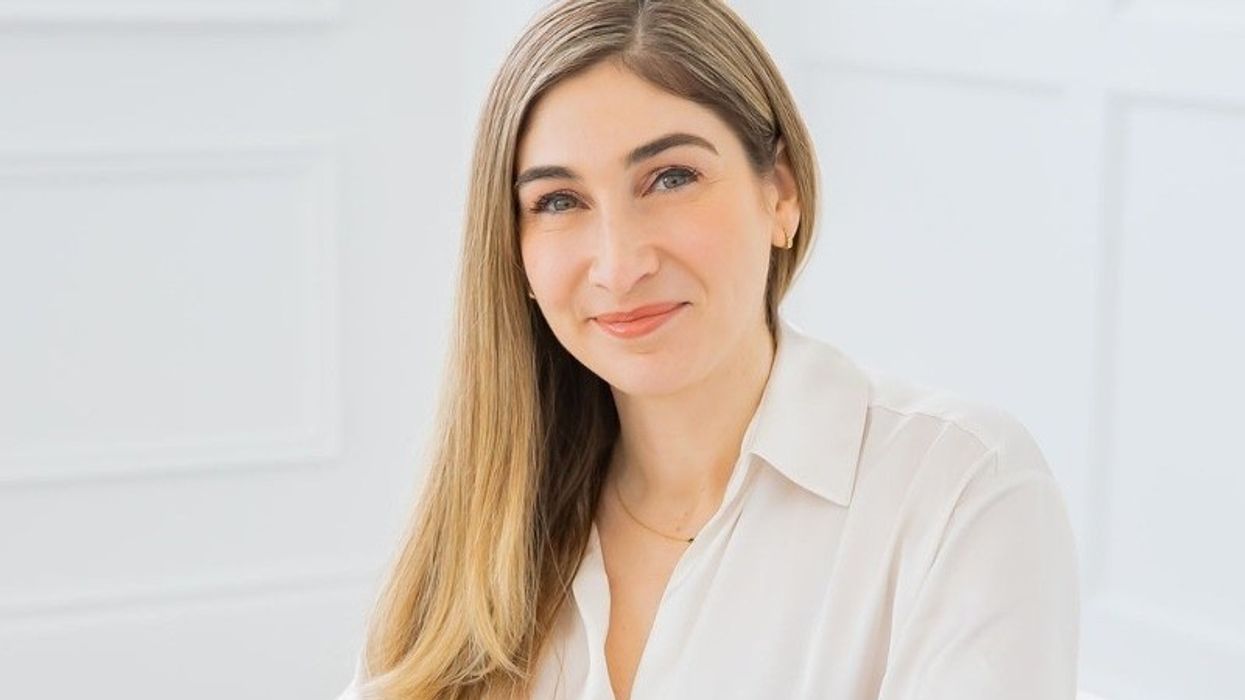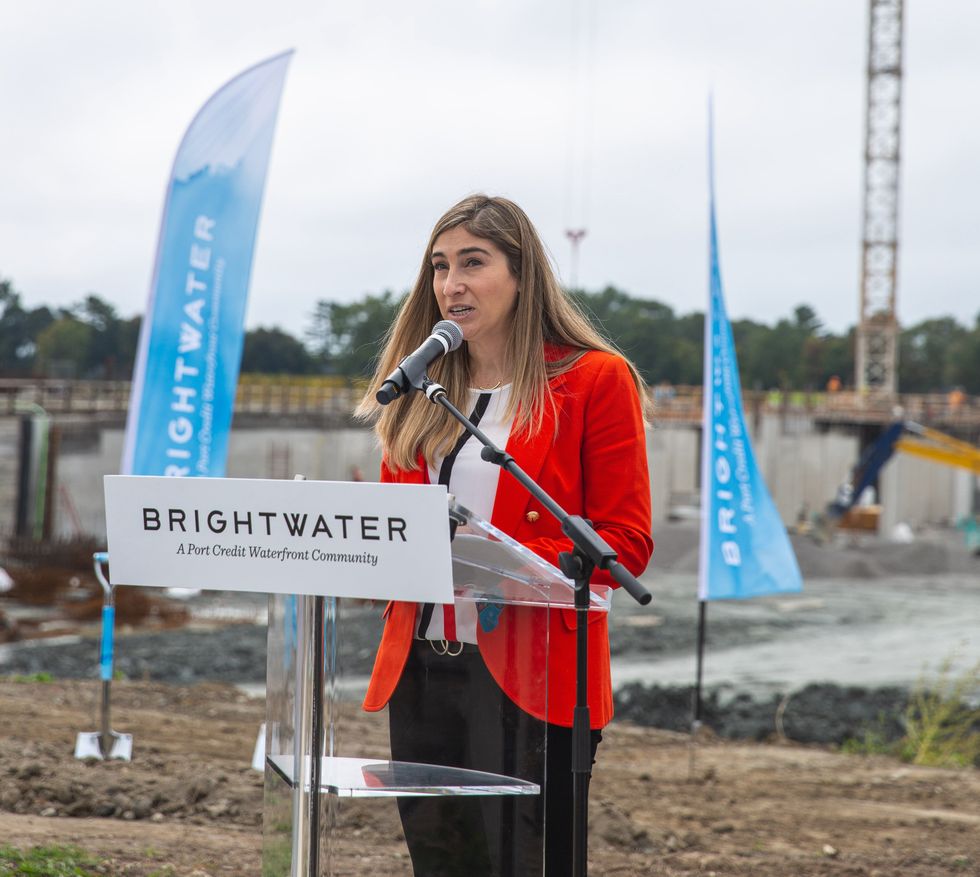As Vice President of Planning and Development for one of the largest ongoing real estate developments in the Greater Toronto Area, Christina Giannone is incredibly familiar with what it takes to actually get something built.
But that wasn't always her plan.
Despite growing up in a family in the home-building business, Giannone says she initially planned to go into marketing and advertising, even obtaining a business degree from the University of Toronto. But after a chance opportunity had her step into a role on the development side, she's never looked back.
Giannone now oversees the gargantuan Brightwater development in the Port Credit region of Mississauga — her hometown. At 72-acres with 3,000 residential units and more than 300,000 sq. ft of retail and office space, it's no small undertaking.
We caught up with Giannone to discuss her career, Brightwater, and what it's like being one of the few female leaders in the development industry.
STOREYS: Having wanted to go into marketing, how did you end up in the real estate world?
Christina Giannone: When I graduated from university, my father's company, FRAM, needed someone to step into a planning role and that's something that I did not have experience in at the time, but I said, 'I'm happy to fill in.' Previously, my involvement was always in the sales office — so the sales and marketing side was, again, what I was thinking about — but then when I worked on the planning and development side, I fell in love with that. It was a brand new side of the company — the industry – that I wasn't familiar with, and I really didn't look back, so it was sort of luck that led me into finding my passion.
S: Do you remember what the first development you ever worked on was?
C: It was called North Shore and it was in Port Credit. It was a 22-storey, 214-unit building, so it was a what south Mississauga at the time would have seen as a high-rise. My responsibility was to work with the staff to go through the site plan, finish up the rezoning, get the building permits. I was just absolutely fascinated with the relationship building and the negotiating and finding win-win solutions — that was really what I fell in love with. I loved that project so much that my first home that I ever bought was in that building, because if I'm part of that team working on it and getting the approvals, I want to live there, so that's where my husband and I first moved in when we got married.
S: You were really putting your money where your mouth is.
C: Exactly. I wanted to understand the full experience. What does living in a condo mean? From the from the very first stage, from pre-construction colour selections, all of that — I really wanted to understand the full picture.
S: You grew up in Port Credit, so what's is like getting to develop such a large area of where you grew up?
C: It's a dream come true, truthfully. I was born and raised in Port Credit and I always knew the Brightwater site as a fenced-off, mysterious property no one had access to. Then, in 2015, when the request for proposal was circulated, I said I have to be involved in this. I was working for FRAM at the time, so I made sure that I was involved in putting that RFP together — that submission was in 2016. I then went on mat leave and came back from mat leave early to work on this project because the partnership was successful, so I applied to the partnership and they selected me to be involved. I started off as a project manager there and I've grown over the years. Like I said, I was pregnant with my daughter and she's now seven and a half.
S: Brightwater seems to have a real emphasis on different housing types. How important was that when you were designing the project?
C: Very, and for various reasons. Before the property even came for sale, [the owner] Imperial Oil worked with the City of Mississauga and the local community and the very active ratepayer associations that are in Port Credit to create what they called Inspiration Port Credit. They came up with this master planning framework for what Brightwater could look like, and so what we saw from that was that they wanted low-rise on the periphery, which made sense because on the east and west sides of the site, and even to the north, there's low rise, single-family homes. Then the taller towers would be central to the site. We stayed true to that through our design process. And with 72 acres and 3,000 units, you want a variety. It's a community and what it means to be part of a community is that you've got different types of housing, you've got different levels of affordability, you've got services, you've got office and retail, school, all of these components. So having that variety was really important to the overall project,
S: Mississauga has changed significantly in the last 10-15 years. What is that like as someone who's lived there through it — how has it changed from your perspective?
C: To me, what makes Port Credit really special are the community events and the retail main street, and so what I see Brightwater doing, and what I've seen other development in Port Credit doing — because as you said, over the years, it's changed a lot — is it's enhancing what the idea of community is. Previously, it was a very industrial town and village, so a lot has changed, but I think that the idea of a modern village is still very well kept and it has a lot to do with the placemaking and the community spirit.
S: The real estate world in general, especially the development sector, has such a small proportion of women, with even fewer in leadership positions. Is that something you were conscious of when deciding to go into the field? Or something you ever become conscious of when working on projects?
C: I'm aware of it in certain tables that I sit at and whatnot, but I grew up with three brothers in a competitive family, so it never fazed me to be in that environment. But I will say that I am encouraged by the number of women that I see in development. I sit on the board of the Ontario Home Builders' Association, I see the executives that are there, I see how more female voices are there, and I think that's really important. So I'm excited and encouraged to see more of a balance.
S: Do you have any advice for women who want to enter the development space, or who want to advance their career within it?
C: I'd absolutely say find a mentor and network. I think that is so important, and that's probably true in any industry. I'd say that I'm an introverted extrovert, or maybe the other way around, but I always struggled to go to the events and introduce myself and put myself out there, but what I'll say is in my recent experience with OHBA and taking on a board role, facing my fear of imposter syndrome, these are things where you really have to to get out of your comfort zone and you will notice the waves that will be created. Even though in our industry there's a lot happening in the GTA and in Ontario, it's still a pretty small industry, so getting yourself out there making those connections, that's where women have to put themselves out there more.
Responses may have been edited for clarity and length.






















